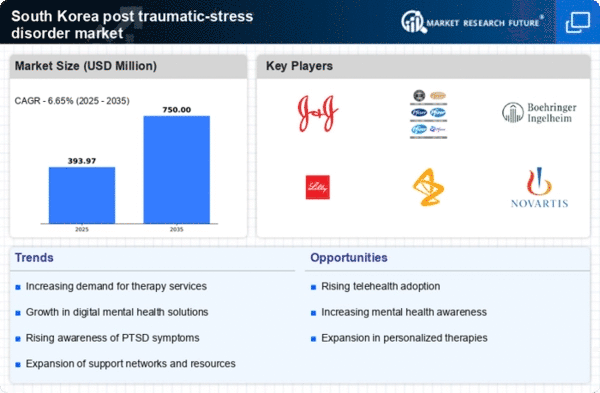Advancements in Treatment Modalities
Innovations in treatment modalities for PTSD are significantly influencing the post traumatic-stress-disorder market. Recent developments in pharmacological therapies, such as the introduction of novel antidepressants and anxiolytics, have shown promise in alleviating symptoms. Additionally, the integration of evidence-based psychotherapies, including cognitive-behavioral therapy (CBT) and eye movement desensitization and reprocessing (EMDR), has gained traction among practitioners. The South Korean healthcare system has allocated approximately $50 million to research and development in mental health treatments, indicating a commitment to improving care for PTSD patients. These advancements not only enhance treatment efficacy but also encourage more individuals to seek help, thereby expanding the market.
Growing Role of Digital Therapeutics
The emergence of digital therapeutics is reshaping the landscape of the post traumatic-stress-disorder market. Mobile applications and online platforms designed to provide therapeutic interventions are gaining popularity among patients seeking accessible treatment options. In South Korea, the digital health market is projected to reach $1 billion by 2026, with mental health applications comprising a significant portion of this growth. These tools offer self-help resources, guided therapy sessions, and community support, making them attractive alternatives for individuals hesitant to seek traditional therapy. As digital solutions become more integrated into mental health care, they are expected to play a crucial role in expanding the post traumatic-stress-disorder market.
Rising Awareness of Mental Health Issues
The increasing awareness of mental health issues in South Korea has a profound impact on the post traumatic-stress-disorder market. Public campaigns and educational programs have been initiated to destigmatize mental health conditions, leading to a greater understanding of PTSD. This heightened awareness is reflected in the growing number of individuals seeking treatment, which has surged by approximately 30% over the past five years. As more people recognize the symptoms and effects of PTSD, the demand for therapeutic interventions and support services is likely to rise. Consequently, this trend is expected to drive growth in the post traumatic-stress-disorder market, as healthcare providers expand their offerings to meet the needs of an increasingly informed population.
Legislative Support for Mental Health Services
Legislative measures aimed at enhancing mental health services are emerging as a key driver for the post traumatic-stress-disorder market. Recent laws have been enacted to improve access to mental health care, including provisions for insurance coverage of PTSD treatments. This legislative support is crucial, as it encourages healthcare providers to offer a wider range of services and ensures that patients can afford necessary treatments. With approximately 40% of individuals with PTSD reporting financial barriers to care, these reforms are likely to facilitate greater access to treatment. As a result, the post traumatic-stress-disorder market is expected to experience growth as more individuals seek and receive the care they need.
Increased Military and Veteran Support Programs
The South Korean government has recognized the unique challenges faced by military personnel and veterans suffering from PTSD, leading to the establishment of specialized support programs. These initiatives aim to provide comprehensive mental health services tailored to the needs of this population. With an estimated 20% of veterans experiencing PTSD, the demand for targeted interventions is substantial. Funding for these programs has increased, with the government investing over $30 million annually to enhance mental health resources for veterans. This focus on military and veteran support is likely to bolster the post traumatic-stress-disorder market, as it creates a structured pathway for affected individuals to access necessary care.
















